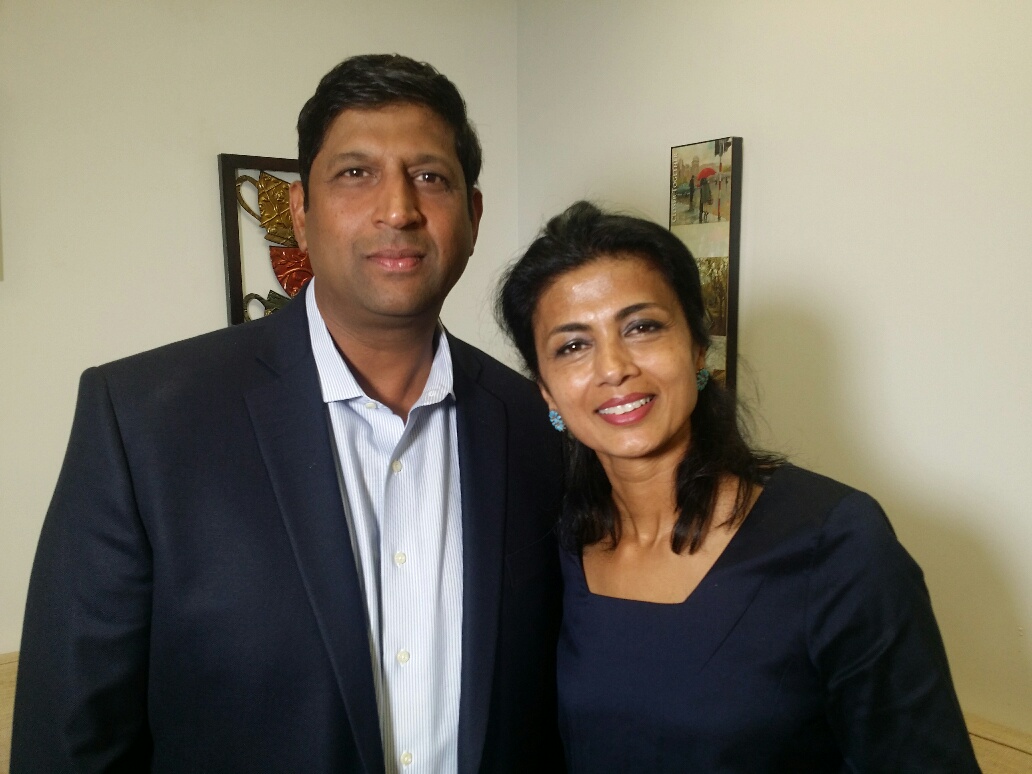BOSTON—By her own admission, she says she belongs to India’s “brain drain” generation. She was born in India and came to the United States in 1991. Today, Nilanjana Bhowmik heads Boston’s latest woman-lend venture capital firm: Converge. She was elected president of TiE Boston this year, and became the first woman to hold the role in the organization’s 20-year history.
On Oct. 26, TiE-Boston will receive the Best Non-Profit Organization Award at New England Choice Awards Gala at Westin Hotel in Waltham, MA.
In an exclusive video interview on Chai With Manju, Ms. Bhowmik talks about her journey from India to the United States and France and then to the world of venture capital where all women teams received only 2.2 percent of capital in the United States in 2017.
Her secret of success? Obviously education and analytic mind, but most importantly of her attitude of looking at things: “Every situation to be an opportunity.”
To view the full interview, please click here.
Ms. Bhowmik is founder and general partner of Boston-based venture capital firm Converge. Prior to founding Converge, Ms. Bhowmik was a General Partner at Longworth Venture Partners where she led the firm’s investments in enterprise technology.
Her investments span big data, advanced analytics, storage, software defined networking, cybersecurity and cloud dev-ops. As an investment banker at Broadview (now Jefferies), she led the bank’s research publications of market maps on middleware, application and security software, and honed her ability to assess emerging tech markets with massive potential.
She has executed numerous M&A transactions of leading enterprise tech companies. She received her B.Eng. in Computer Science from Indian Institute of Technology, her M.S. in Computer Science from University of South Carolina, and her MBA from INSEAD. In France.
Laser focused on the long game, she is a distance runner and her portfolio CEOs’ first call, be it at midnight or 6:00 AM.
Writing about herself at the New England Venture Capital Association’s website, she beautifully analyzes India’s so-called “brain drain” generation under which most of the successful Indian-American businessmen fall today.

Outgoing TiE Boston President and TiE Global Vice Chair Praveen Tailam and TiE Boston President Nilanjana Bhowmik
“I belong to the “brain drain” generation that was India’s loss and America’s win. Post-independence from Britain in 1947, India built strong educational institutions that trained some of the best engineers, scientists and doctors. But a closed economy, stalled growth and continued political quagmire led to deep disillusionment about the future and an exodus of the best trained from elite institutions including the Indian Institute of Technology, Indian Institute of Science and All India Institute of Medical Science.,” she wrote at the New England Venture Capital Association website. “The phenomenon was most acute from the mid ’70s to the ’90s, so much so that it was dubbed the “brain drain”. The United States was the main beneficiary for several reasons: commonality of the English language; highly selective graduate programs at top Universities that offered generous scholarships; clear immigration policies that gave an onramp from graduate programs to employment & naturalization; a dynamic economy; and above all, an open and welcoming society.”
Then she adds that India’s “brain drain” generation rolled up its sleeves and got to work.
“Their contribution to the US economy, particularly in tech has been remarkable: Vinod Khosla co-founder Sun Microsystems, Naren Gupta co-founder Integrated Systems Inc., Vinod Dham “Pentium Engineer”, Prabhu Goel founder Gateway Design Automation, Sabeer Bhatia founder Hotmail, Sundar Pichai CEO Google, Satya Nadella CEO Microsoft, Padmasree Warrior ex-CTO Motorola & CISCO, Shantanu Narayen CEO Adobe Systems and closer home in Boston, Gururaj “Desh” Deshpande co-founder Sycamore Networks, Jit Saxena co-founder Netezza, Vijay Manwani co-founder BladeLogic, Ash Ashutosh founder Actifio and Nitin Nohria Dean Harvard Business School, to name just a few,” she wrote on the New England Venture Capital Association website. “Collectively, Indian founders account for 33% of all immigrant founded startups in the United States (Kauffman Foundation).”
Their story in turn is part of the even broader success narrative of immigration and entrepreneurship in the United States, she adds.
“Together, they underscore how a well-designed immigration policy attracts the very best talent from all parts of the world to fuel the nation’s economy. The “brain drain” generation could have gone to any developed country, they chose to come to the United States. Favorable immigration policies were a major factor,” according to Ms. Bhowmik.

